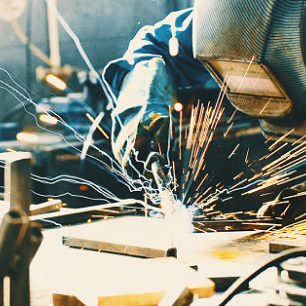Jump to:
Exploring Certifications and Career Advancements
In the ever-evolving world of welding, career advancement often means looking beyond the daily grind of being under the hood. For many welding professionals, certifications offered through AWS provide the perfect pathway to expand their knowledge, increase their earning potential, and extend their careers in the industry.
During a candid conversation, Daryl Peterson, quality manager at Central Maintenance & Welding, Lithia, Fla. (AWS CWI, SCWI, ASNT Level III, API 653, and SSPC PCI Level II inspector) and host Jason Becker shared valuable insights into various AWS certifications and endorsements that can help welders and welding inspectors (especially those who may find welding physically demanding or want to move into supervisory or inspection roles) take the next step in their careers.
Certified Welding Supervisor (CWS)
This certification is ideal for welders with five to seven years of experience, ready to move into management positions. The CWS program incorporates welding economics, safety, quality, and team management skills, which can significantly benefit employers.
A key example discussed was the concept of overwelding. A welder putting in more material than necessary — for instance, making a ¼ in. weld when only 1/8 in. is required — wastes resources. The experts illustrated how a weld twice the specified size can contain up to four times the amount of material, representing 300% overwelding. This excess not only wastes materials but also time and money.
The CWS program teaches supervisors to recognize and prevent these inefficiencies, making it a valuable credential for those working with manufacturers or erectors. The certification also covers areas like finding gas leaks in bulk systems and implementing lean manufacturing principles in welding shops.
Certified Welding Inspector (CWI)
The CWI credential is the most recognized AWS certification. Both experts agreed that obtaining the CWI credential was one of their best career moves. With a CWI certification, individuals can inspect welds, qualify other welders, and significantly expand their career opportunities. However, they emphasized that the CWI exam is challenging and requires substantial preparation. Many companies make the mistake of sending their best welder to a one-week CWI seminar with little preparation, contributing to the high failure rate for first-time test takers. The experts stressed that understanding code books, welding symbols, and standard terminology is essential before attempting the exam, and applicants should be familiar with standards such as AWS 3.0, Standard Welding Terms and Definitions, and A2.4, Standard Symbols for Welding, Brazing, and Nondestructive Examination.
Certified Welding Educator (CWE)
The CWE certification provides an excellent credential for those interested in teaching. To obtain this certification, candidates must have a current Certified Welder endorsement and pass parts A and B of the CWI exam.
“I think that should be almost a bare minimum requirement if you’re going to be a welding educator,” Becker suggested. Having the CWE helps establish credibility when teaching students and provides a way for educational institutions to vet potential instructors.
Specialized Endorsements
Beyond these primary certifications, the experts discussed several specialized endorsements that can enhance a CWI’s credentials. The following four are now mandatory endorsements to obtain the Senior Certified Welding Inspector (SCWI) credential:
- Welding Performance Qualifier: This endorsement focuses on establishing best practices for welder testing and is particularly valuable for those working with an Accredited Testing Facility.
- Welding Procedure Qualifier: This endorsement provides expertise in creating compliant processes for those who develop welding procedures. The experts noted that while not as difficult as the CWI exam, it still requires substantial knowledge.
- Welding Coordination and Quality Assurance: This endorsement provides expertise in welding quality assurance programs and the principles and practices of auditing quality management systems.
- Nondestructive Examination Coordination: This newer endorsement provides skills in the application of nondestructive examination (NDE) methods to meet code and customer requirements. It helps bridge the gap between AWS certifications and the NDE field.
AWS B2.1 Specification
A significant portion of the discussion centered around AWS B2.1, Specification for Welding Procedure and Performance Qualification, which both experts praised for its versatility. Unlike more restrictive codes, like D1.3, Structural Welding Code — Sheet Steel, B2.1 allows welders qualified on certain materials to work with a wide range of related materials. That broader approach makes B2.1 particularly useful in certain situations for qualifying welders across multiple material types with fewer tests, saving time and money.
The Importance of Continuous Learning
Both experts emphasized the need for continuous learning and staying updated with code changes. They shared personal experiences about discovering new information after decades in the industry, highlighting how even experienced CWIs must regularly reference code books rather than relying on memory.
Getting Involved with AWS Sections
Local AWS sections are a way to network, learn, and build relationships within the industry. These sections offer technical demonstrations, educational opportunities, and connections that can help professionals advance their careers. Becker shared how involvement in his local section, which was a long drive away for him, led to starting a new section much closer to his area, expanding access to AWS resources. They discussed the potential for satellite sections to serve areas far from existing sections, making it easier for professionals to participate.
Conclusion
For welders looking to advance their careers beyond the daily physical demands of welding, AWS certifications and endorsements offer clear pathways to growth. Whether moving into supervisory roles with a CWS, inspection roles with a CWI, teaching with a CWE, or specializing with various endorsements, these credentials provide credibility and expanded knowledge.
Obtaining these certifications requires dedication to studying, hands-on experience, and ongoing education. By choosing certifications aligned with their career goals and industry needs, welding professionals can ensure long, successful careers in the field, whether under the hood or beyond.


